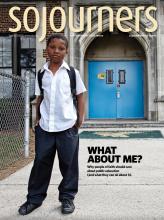Ask a random group of people, “How do we improve our public schools?” and you’re apt to get divergent, passionate answers. Christians, like other citizens, have different opinions on how to heal what’s hurting in our education system. What we can share is a belief that all children are truly precious in God’s sight and an understanding that public education is a key component of the common good—that a healthy school system has the potential to bring opportunity and uplift to children regardless of their economic status.
Jan Resseger is the minister for public education and witness with the national Justice and Witness Ministries of the United Church of Christ. She spoke with Sojourners associate editor Julie Polter in June.
Sojourners: Why is public education a commitment for the United Church of Christ?
Jan Resseger: The commitment to education is a long tradition for us. Our pilgrim forebears brought community schooling and higher education to the New England colonies—New England congregationalism is one of our denominational roots. Another root is the American Missionary Association (AMA), an abolitionist society that grew out of the defense committee for the Africans on the slave ship Amistad. The AMA founded schools for freed slaves as a path to citizenship across the South during and after the Civil War.
Several denominations came together as the UCC in 1957, and our general synods since then have taken stands on issues such as the protection of the First Amendment in public schools and supporting school desegregation through the ’60s, ’70s, and ’80s. From 1958 to the present, we have spoken to institutional and structural racism and classism in schools. We also have addressed privatization, because we’ve been strong supporters for many, many years of public schools as key to the strength of our society and democracy.
Read the Full Article
